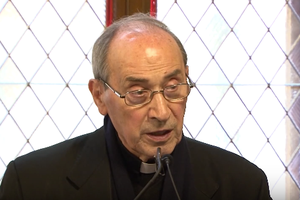Synod of the Family Shows Papal Rethink of Petrine Office, Says Cardinal Kasper

WASHINGTON — A project begun by St. John Paul II and Benedict XVI to restore the exercise of the Petrine Office to its early Church roots is coming to fruition under Pope Francis, and is being seen in the synod on the family, according to Cardinal Walter Kasper, the Vatican’s former point-man for ecumenism.
Cardinal Kasper, the president emeritus of the Pontifical Council for Promoting Christian Unity, spoke at length Nov. 6 about Pope Francis and his theological vision at Catholic University of America in Washington, D.C., where he was on-hand to receive the university’s 2014 Johannes Quasten Award.
Cardinal Kasper said Pope Francis’ first introduction of himself simply as the “bishop of Rome” reflects the mind of the Second Vatican Council to renew the universal Church as a “communio” and return the exercise of the Petrine ministry of the Bishop of Rome in relation to the whole Church as envisioned by the early Church.
“As communion, the Church has its own constitutional structure,” he said. “It is not a federalist nor a centralized system, in which the local churches are provinces of the whole Church and dependent unilaterally on what comes from the center.”
“The one Church is present in the local churches, and in them the one Church takes on a concrete local form and a concrete face,” he said.
“The local churches, vice versa, must also live in this one Church.”
Cardinal Kasper explained that when Pope Francis speaks of “decentralizing” the Church, and strengthening the local bishops’ conferences, “it must be understood within this framework.”
“It is not meant to call into question the Petrine Office as the visible center of the Church,” he said.
“He wants to talk up an impulse of Pope John Paul II, which Benedict XVI also made his own, and like these two persons, he declared himself ready to enter into an ecumenical dialogue about how the Petrine Office can be exercised today in a way which can be accepted by all, without giving up its substance.”
Pope Francis repeated that offer to Ecumenical Patriarch Bartholomew I of Constantinople and other church leaders, Cardinal Kasper noted, during their historic meeting in Jerusalem on May 25 at the Holy Sepulcher.
Cardinal Kasper said the “crucial point” is combining “collegiality” (the idea of the Pope governing the Church with the bishops of local churches) and “synodality” (the idea that the local churches participate in governing the universal Church, through deliberative bodies as synods and episcopal conferences). The cardinal said the two principles should not be considered “anti-thesis” of each other, but complementary instead.
He said the Apostles’ council at Jerusalem described in Acts 15 “the early Church’s condition was foreshadowed,” and that following the council, “in difficult situations” the Church would resort to synods and councils. He noted how the “synodical principle” has figured in the Eastern Church above all.
Cardinal Kasper said that Pope Francis welcomed the first steps toward a common Orthodox-Catholic understanding of the primacy of the Bishop of Rome taken in the 2007 Ravenna agreement. It was “unfortunately rejected by the Moscow Patriarchate,” the largest of the Eastern Orthodox churches, but Orthodox-Catholic dialogue still continues.
But Pope Francis intends to bring those synodal elements “into the Catholic church itself” through the synods of bishops, said the Cardinal.
“The important step was the calling of a synod [and] the initiation of the synodal process for the pastoral challenge of the family in the context of evangelization,” he said.
Cardinal Kasper said this synodality could be seen in the preparation for the October 2015 synod on the family, and how it has “involved the whole community of believers.” He pointed to the questionnaire sent out to all the local churches, people were invited to pray for the synod, and the extraordinary synod in October 2014 which clarified the outstanding questions for the ordinary synod to address. The method allowed “dioceses, bishops’ conferences, and the whole people of God to be involved.”
“That is a new style,” he said. “It has nothing to do with the introduction of democratic constitutions to the Church, nor is it a matter of majority decisions, but [it is] of joy, and of attentive listening to what the Spirit says to the churches.”
He explained that the Pope views that the final role of the Synod is to discern the Holy Spirit speaking through all the testimonies and experiences of faith, and the common witness to the Gospel.
“As Pope Francis made clear at the end of the extraordinary Synod after having listened to the Synod, then he spoke.”
Cardinal Kasper concluded his address by saying that Pope Francis’ reforms in toto – not just the synodal renewal — form the “program of a century” and will not be achieved in a single papacy, but whether they succeed will depend on the response of the universal Church at all levels of her life.
Peter Jesserer Smith is the Register’s Washington correspondent. He can be reached on Twitter here.
In lieu of comments below, please pray for Pope Francis and the unity of the Christian churches.
- Keywords:
- collegiality
- early church
- ecumenism
- extraordinarry synod on marriage and the family
- extraordinary synod
- extraordinary synod on the family
- orthodox church
- patriarch bartholomew
- petrine office
- pope francis
- ravenna
- synod
- synod on the family
- synodality
- vatican ii
- walter kasper

















